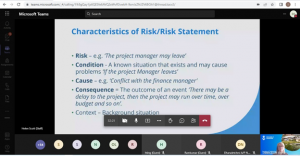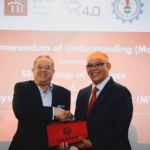Written by: N. Dhanaletchmi (SCPG)
Organizer: Dr Ida Fahani Binti Md Jaye (SCSJ)
An initiative of Joint Faculty of Engineering SEGi Group of Colleges.
In the field of project management, managing risk is a crucial process as issues will inevitably happen, and a mitigation strategy must be in place to manage the risks. The project of risk management is the process of recognising, analysing and responding to any risk that might develop during the course of a project’s life cycle in order to keep the project on track and accomplish its objectives.
A risk is anything that could potentially impact a project’s timeline, performance, or budget. Risks are possibilities, and when they become realities in project management, they are classed as “problems” that must be addressed. Risk management is therefore the act of recognising, categorising, prioritising and planning for risks before they become concerns.
Risk management can take many forms depending on the project. Risk management solutions for large-scale projects may require considerable and thorough planning for each risk to ensure that mitigation strategies are in place if problems develop. Risk management may be as simple as a prioritised list of high, medium, and low priority hazards for smaller projects.
On this note, SEGi has introduced a unique learning technique based on real-world practice, developed in collaboration with our partner university – University of Sunderland. A guest lecture was conducted with Professional Engineering Management Technique (EAT340) students in collaboration with the University of Sunderland and SEGi Group of Colleges’ Faculty of Engineering. The speaker was Dr Helen Scott, a senior lecturer at the David Goldman Technology Centre of the University of Sunderland. The lecture was entitled “Managing Project Risks” and highlighted risk-management techniques in a project.
The discussion also covered the concept of risk tolerance such as how much risk a project team is willing to accept when designing an innovation-related project. This is because an innovation project has an elevated risk appetite and project managers must strategically spread the risks across various portfolios of the project.
The talk concluded with Industry 4.0 and its related risks which includes the sensitivity and vulnerability of data, lower number of qualified workers, attacks from internet network, data losses and errors in data processing. This session provided a wonderful opportunity to students on understanding various techniques in managing project risks and risks related to innovation projects.
We would like to thank the University of Sunderland and our School of Engineering for making this lecture a success.








